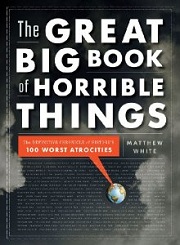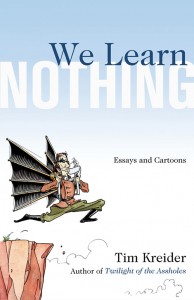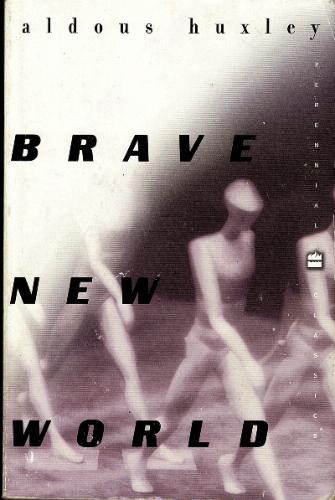The 3 best books I read in 2013
It’s common in December to see lists of “best of the year” for books and films. I read 20 to 30 books a year but rarely do I read books published in the current year. I don’t have anything against new books, I certainly buy many of them, but I’m drawn to books that have been around awhile and still interest me. Perhaps these books ask deeper questions and provide deeper answers? Or maybe I’m merely trying to combat the cultural pull towards neophillia and the rejection of things purely because of their age.
Since most people read only a handful of books a year it’s silly not to include books simply because of when they were published. Odds are high that even if you check out the NYTimes best books of 2013, you still haven’t read most of the books they recommended from 2012, or 2005, or 1905.
With this in mind, here are the three best books I read in 2013, regardless of when they were published:
 The Great Big Book of Horrible Things, by Matthew White (2011) – It sounds like a children’s book, but it’s far from it. With great style and flair White takes an unconventional approach to explaining the history of civilization. He uses the worst atrocities, from genocides to wars, to explore the history of the World. My world history has always been spotty and I found this book to be a tour de force, making a laundry list of facts and events I’d never understood comprehendible and fascinating. The lists of his rankings of the worst atrocities, and their most frequent causes (religious wars? politics?) are worth the price of admission alone (my full review).
The Great Big Book of Horrible Things, by Matthew White (2011) – It sounds like a children’s book, but it’s far from it. With great style and flair White takes an unconventional approach to explaining the history of civilization. He uses the worst atrocities, from genocides to wars, to explore the history of the World. My world history has always been spotty and I found this book to be a tour de force, making a laundry list of facts and events I’d never understood comprehendible and fascinating. The lists of his rankings of the worst atrocities, and their most frequent causes (religious wars? politics?) are worth the price of admission alone (my full review).
 We Learn Nothing, by Tim Krieder (2013) – This collection of essays, with a few illustrations, does what all writers wish they could do: invite just about any reader into an intelligent, conversational exploration of some universal themes like friendship, belief and identity. It’s the kind of book you can give to just about any adult and they’ll respond with stories of their own and new questions about various notions they’ve held close, but unexplored until now. (my full review)
We Learn Nothing, by Tim Krieder (2013) – This collection of essays, with a few illustrations, does what all writers wish they could do: invite just about any reader into an intelligent, conversational exploration of some universal themes like friendship, belief and identity. It’s the kind of book you can give to just about any adult and they’ll respond with stories of their own and new questions about various notions they’ve held close, but unexplored until now. (my full review)
Brave New World, by Aldus Huxley (1931). I am a big fan of dystopian novels, and although I’ve read 1984 many times I’d never read Huxley. I was surprised to learn Brave New World predated 1984, first published in the 1930s, more than a decade before Orwell’s book. It was a true surprise how bold and prescient Huxley was, even though I knew many elements of the story through literary osmosis. And although the structure of BNW can be challenging at times, I’ve found myself thinking about it often since I read it (Related: this fantastic comic comparing the predictions of 1984 with BNW)


If you liked Aldus Huxley’s masterpiece you will love 1984 by Orwell and Farenheit 451 by Ray Bradbury. Those three books alone worth an entire library :)
I agree with Luca’s addition of the Bradbury F451, also Vonnegut’s Mother Night and Slaughterhouse 5. Also, almost any of Carl Sagan’s books, esp. Pale Blue Dot, and Demon-Haunted World: Science as a Candle in the Dark. He’s been dead 17 years, but what he said there and in his final interview, with Charlie Rose (look it up, it’s on YouTube!) is probably as true (and damn scary), or more so, now than when he wrote it. Also, any of Michael Shermer’s books. Last but not least, I’d add Scott’s own Mindfire! Go Scott!
F451 is one of my favorites. I’ve even watched the French film :)
One of my favourite dystopias was made in 1948, like Orwell’s, and is still in print, like Orwell’s, and has the electronic ears and eyes only in certain places, like how Orwell’s televisors were for party members, not the proles. That story is in Revolt in 2100 by Robert Heinlein. I learned a lot.
I thought of the afterword when we declared war on terror, and then learned of Muslim violence and the Saudi export of madrases (schools) that teach hatred.
The afterward has the line “It is a truism that almost any sect, cult or religion will legislate its creed into law if it acquires the political power to do so, and will follow it by suppressing opposition, subverting all education to seize early the minds of the young, and by killing, locking up or driving underground all heretics.This is equally true whether the faith is communism or Holy-Rollerism; …
I like the book because the hero (the story is told first person) has to undo the conditioning of his society, sort of like we did in the 1960s, only against greater odds. When reading:
“Sometimes I would glance over my shoulder to see who was watching me, frightened in spite of myself. I began to sense faintly that secrecy is the keystone of all tyranny. Not force, but secrecy … censorship. When any government, or any church for that matter, undertakes to say to its subjects, “This you may not read, this you must not see, this you are forbidden to know,” the end result is tyranny and oppression, no matter how holy the motives.”
I regret to say I can really relate, but I am much better now.
Thanks for this lead Sean. I’ll definitely check out this story.
Thank you for sharing these great books! I will read them too.